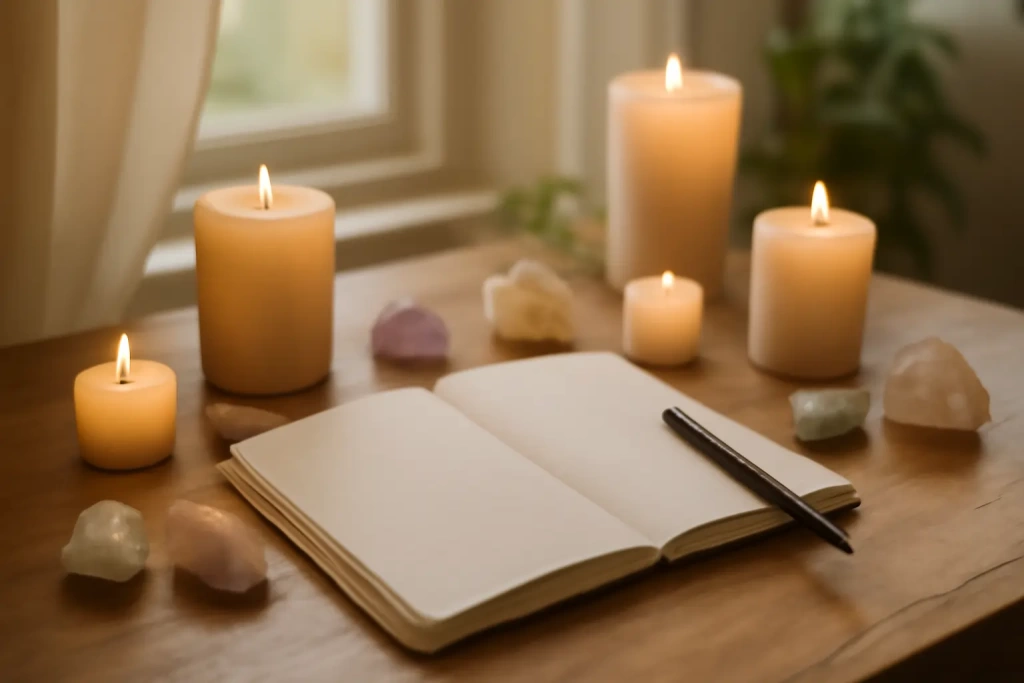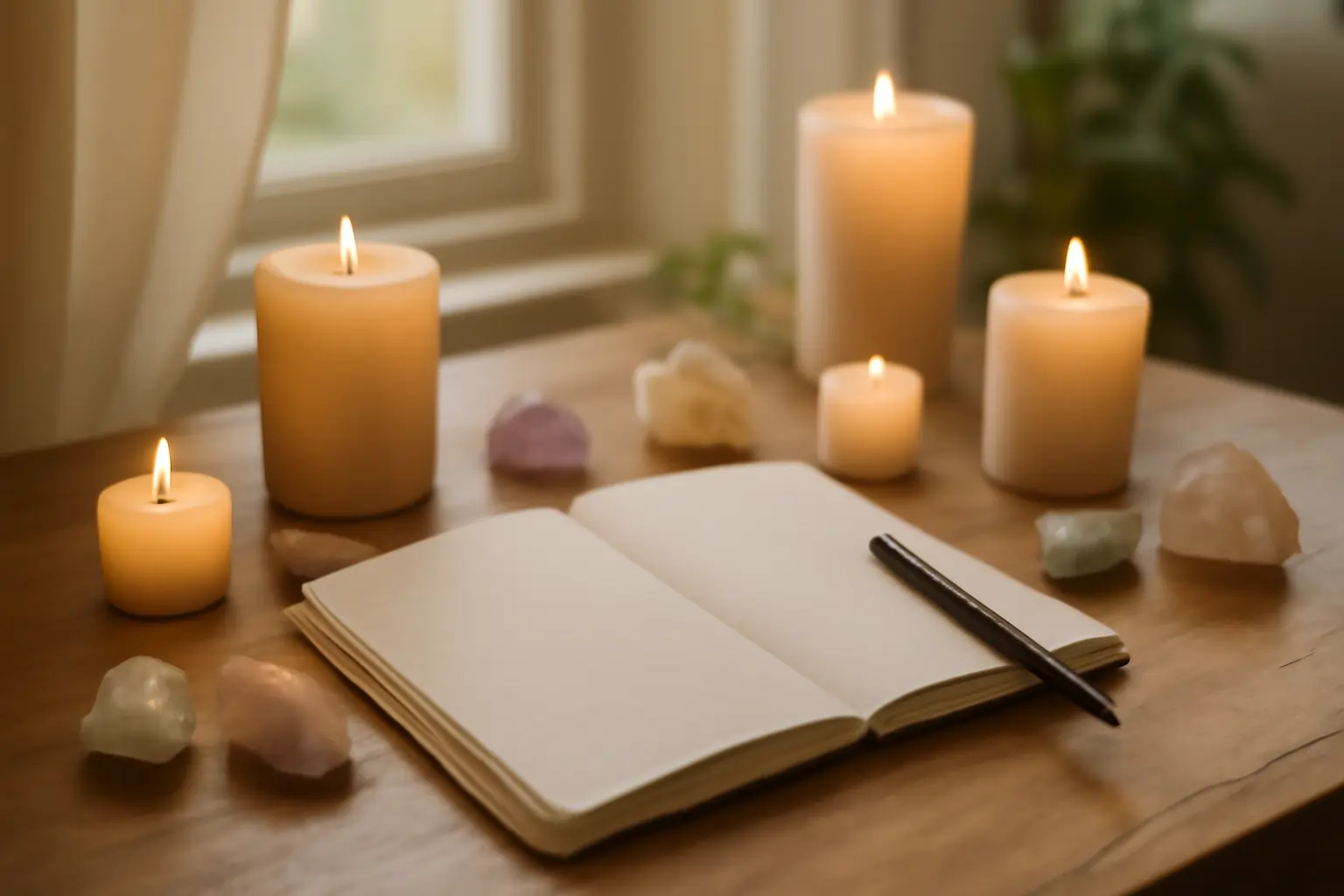
Introduction: The Power of Writing in a Woman’s Spiritual Journey
Life for women often feels like a constant balancing act—caring for family, nurturing relationships, managing work, and still trying to make space for personal well-being. In the rush of daily life, it is easy to feel disconnected from your inner voice and spiritual path.
This is where spiritual journaling for women becomes powerful. Spiritual journaling is not just about writing; it is about reflection, self-expression, and healing. It allows you to slow down, process emotions, and reconnect with your inner self and the divine.
The best part is that journaling does not require you to be a writer. You only need a notebook, a pen, and a few quiet minutes each day.
What Is Spiritual Journaling?
Spiritual journaling is the practice of writing to explore your spiritual growth, emotional well-being, and inner journey. Unlike a diary that records events, a spiritual journal goes deeper into your thoughts, beliefs, and experiences.
It can be used to:
- Record daily gratitude.
- Write down affirmations, scriptures, or prayers.
- Reflect on emotional challenges.
- Track personal growth and spiritual insights.
- Release negative emotions and welcome healing.
Think of it as a safe and private conversation with your soul.
Why Spiritual Journaling Matters for Women
Women often carry unspoken emotional, mental, and physical responsibilities. Journaling gives women a sacred space to pause, reflect, and nurture themselves.
Key Benefits:
- Emotional Healing – Writing releases suppressed emotions and reduces stress.
- Clarity in Decisions – Journaling helps organize thoughts and make choices with confidence.
- Deeper Faith – Strengthens spiritual practices such as prayer and meditation.
- Self-Empowerment – Encourages women to trust their intuition and inner strength.
- Balanced Living – Restores peace and harmony between mind, body, and spirit.
How to Start Spiritual Journaling
Starting a journaling practice is simple. Here are some easy steps:
1. Choose Your Journal
Use any notebook, diary, or even a digital app. Select something that feels personal and special to you.
2. Create a Calm Space
Pick a quiet spot in your home. You may add calming elements like soft lighting, gentle music, or silence.
3. Set a Time
Decide whether you want to write in the morning to set intentions for the day, or at night to reflect and release stress.
4. Write Honestly
Do not worry about grammar or perfect sentences. This journal is only for you. Let your words flow naturally.
5. Use Reflection Prompts
If you struggle to know what to write, prompts will guide you in meaningful directions.
Reflection Prompts for Spiritual Journaling
Here are some prompts that make journaling easier and more powerful:
Gratitude Prompts
- What are three things I am grateful for today?
- Who in my life supports me the most, and how can I appreciate them?
- What blessing, no matter how small, made me smile today?
Emotional Healing Prompts
- What emotions am I carrying right now?
- Which past experience am I ready to release?
- How can I be more compassionate toward myself today?
Faith and Spiritual Prompts
- What prayer or affirmation feels meaningful right now?
- What do I feel the universe or God is teaching me in this moment?
- How can I bring more mindfulness into my daily life?
Growth Prompts
- What lesson have I learned from a recent challenge?
- In what ways am I becoming stronger every day?
- What step can I take today to live closer to my purpose?
Self-Love Prompts
- What do I appreciate about myself?
- How can I take better care of my body, mind, and spirit today?
- What is one positive belief I want to repeat to myself this week?
Tips for Making Journaling a Habit
- Start small: Write for 5–10 minutes daily.
- Keep it visible: Place your journal near your bedside or desk.
- Stay consistent: Choose a regular time to write.
- Add creativity: Use colors, drawings, or quotes if it inspires you.
- Reflect back: Revisit old entries to notice your personal growth.
Do’s and Don’ts of Spiritual Journaling
Do’s
- Be consistent with your writing.
- Write freely and honestly.
- Allow yourself to feel emotions without judgment.
- Pair journaling with practices like meditation, prayer, or gratitude rituals.
Don’ts
- Do not compare your journal to others.
- Do not aim for perfect writing.
- Do not hold back emotions—you deserve a safe space to express.
- Do not treat journaling as a task; see it as self-care.
FAQs About Spiritual Journaling
1. How often should I journal?
Daily is ideal, but even two to three times a week can create positive results.
2. Do I need a special type of journal?
No. Any notebook or even a digital app will work, as long as it feels comfortable.
3. Can journaling replace prayer or meditation?
Not exactly. Journaling supports prayer and meditation by giving you space to reflect on them.
4. What if I don’t know what to write?
Start with gratitude or use simple prompts. Even one sentence is enough.
5. Can journaling improve mental health?
Yes. It reduces stress, helps process emotions, and supports healing.
Benefits of Spiritual Journaling for Women
Spiritual journaling can create deep and lasting changes in daily life.
- Stress Relief: Helps manage anxiety and calms the mind.
- Emotional Balance: Provides a safe outlet for emotions.
- Stronger Faith: Deepens spiritual connection.
- Self-Discovery: Encourages reflection on personal values and purpose.
- Empowerment: Builds confidence through self-awareness.
30-Day Spiritual Journaling Challenge
If you are ready to begin, try this simple challenge:
- Day 1: Write three things you are grateful for.
- Day 2: Reflect on one lesson life has taught you recently.
- Day 3: Write a prayer or affirmation for strength.
- Day 4: Describe a moment you felt guided or protected.
- Day 5: Write about something you want to release.
- Day 6: Reflect on a dream or hope you carry.
- Day 7: List people who inspire you and why.
Repeat similar themes for the month by rotating gratitude, healing, growth, and self-love prompts. By the end of 30 days, you will feel more grounded and connected.
Want to know more about Festival & Vrata Guides
Conclusion: Writing Your Way to Inner Peace
Spiritual journaling for women is not about perfect words—it is about honesty, reflection, and connection. It is a gentle practice that allows women to pause in their busy lives and focus inward.
By writing a few lines daily, you can experience stress relief, emotional healing, and deeper spiritual growth. Over time, this simple act of journaling transforms into a tool of empowerment and inner peace.
Every word you write is a step toward clarity, strength, and a closer connection with your soul.


